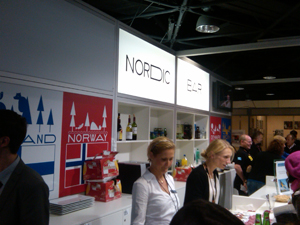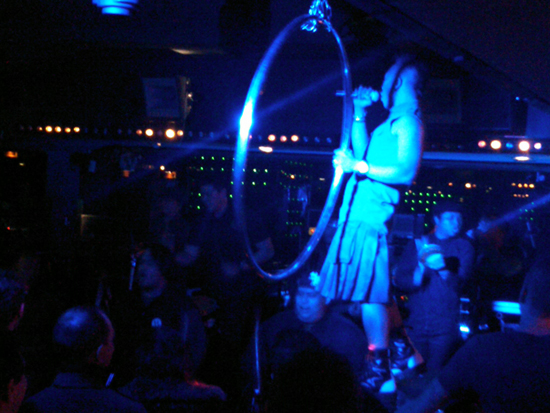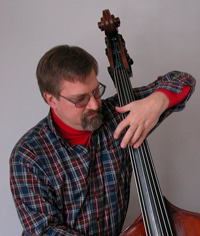It’s been another 24 hours of navigating between panel talks, cocktail parties, showcase performances, and events that are various combinations of the above. Shailendra Pandey began his comments for the morning session (the crux of which I already described yesterday) by commenting on how thrilled he was to see so many people early in the morning since there had been so many parties the night before. Well, there were even more parties last night, and navigating between them to catch the musical offerings requires some fancy footwork since they were taking place all over downtown Cannes. I was thrilled that I got to hear the showcase presented by an agency from the People’s Republic of China. A band from Hunnan performing there named Shanren (Mountain People) created a viable synthesis between traditional Chinese music and heavy metal that was in no way diluted from either genre. Earlier in the day I heard several bands from Germany perform in showcases here at the Palais des Conferences—and, indeed, Brandt Brauer Frick’s indebtedness to Cage and Lachenmann is audible and laubable—but it was better to hear the longer sets later in the evening at an Irish Pub near the train station named Morrison’s, although it was somewhat disorienting to be in an Irish pub listening to German bands in France: I wasn’t sure what language I was supposed to order my beer in.
But if last night’s performance parties were invigorating, this morning’s panel discussions were somewhat less celebratory. I began the morning at the Publishing Summit where a group of representatives from various publishers from around the world pondered where we go from here. While the session was titled “The Next 200 Years of Music Publishing,” the group didn’t seem to get much further than the next couple of years. Hartwig Mausch from BMG stated that while over the last 12 months protecting intellectual property was overshadowed by the economic crisis in most countries, as the world continues to recover this will re-emerge as a priority around the world. Before the panel began, a series of unidentified comments from publishers worldwide were read and one of them posited that as soon as people based in countries with emerging economies became more active as creators rather than as users, intellectual property protection would become a more important priority everywhere. But it felt somewhat surreal to hear this, considering that the Indian film industry is one of the most significant and the music coming out of Africa has had a major impact throughout the world. In fact, Arnold Mabunda from Gallo in South Africa, who was on the panel, reminded the audience that Africa should not be discounted. And in some ways, South Africa has already taken a lead in the new digital environment; he boasted a 48 hour turnaround with online licensing. Considering this, it floored me to hear Jane Dyball from Warner/Chappell claim that a global licensing scheme would have been viable had there been no music industry in place already, but now it’s too late.
The follow-up to that panel was a session further fleshing out the Global Repertory Database idea that Francis Gurry from WIPO was championing on my first day here. A working group has already been formed to work out the details of this, although the panel acknowledged that it is not entirely representative of all the stakeholders. And indeed it’s hard as a composer not to feel left out, considering that the working group consists only of reps from three service providers, three performing rights societies, and two major publishers: Amazon, iTunes, Nokia, PRS, SCAEM, STIM, EMI, and Universal. So much for there being no gatekeepers in the new music paradigm.
It will nevertheless be interesting to see how all this trickles down to the world of people who make music and the world of people who listen to it. The world has definitely come closer together than ever before, but there’s no better proof of the difficulty in crossing cultural divides than in the world of popular music largely driven by lyrics which, by default, can only be in one language. (Although, when I was at the IAMIC meeting in Nice, Robert Singerman gave a presentation in which he claimed that there is now a technology that can take Bob Marley’s voice and have it sing back in any language with a few button clicks. Auto-tune for words!)
I prefered hearing the Mannheim-based band, The Astronaut’s Eye, sing in mostly understandable English and the Munich-based Ya-Ha, whose charismatic female lead singer was actually born in the United States, sing exclusively in German. And I shudder at the thought of how a computer program would destroy the immediacy of the lyrics of the brilliant Canadian singer-songwriter Jill Barber whom I just heard in a showcase two hours ago. Two choice quotes from her lyrics that I quickly jotted down as she sang:
I still dream in color even though I sing the blues.
It’s not the player but the music that I miss.
And now it’s time to log off and go back for more.





